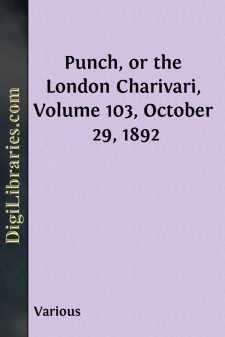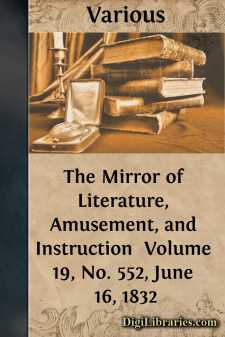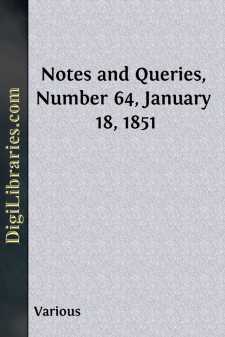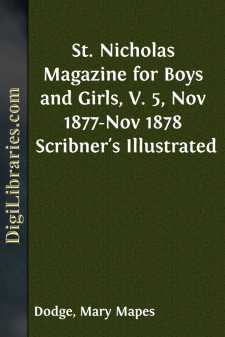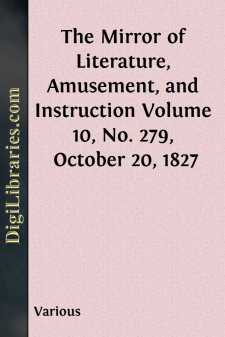Periodicals
- Art 27
- Children's periodicals 59
- Entertainment 5
- Food/Wine 2
- Games/Humor 455
- General 661
- Health 1
- History 53
- House/Home 1
- Regional 62
- Science/Nature 118
- Transportation 10
Periodicals Books
Sort by:
by:
Various
IMPRESSIONS OF "IL TROVATORE." (By a Matter-of-Fact Philistine at Covent Garden.) ACT I. SCENE 2.—Leonora's confidant evidently alive to the responsibilities of her position. Watch her, for example, when her Mistress is about to confide to her ear the dawn of her passion for Manrico. She walks Leonora gently down to the footlights, launches her into her solo, like a boat, and stands...
more...
by:
Various
INSTINCT. "Instinct is a great matter," quoth Falstaff, when called upon to find out a device, a "starting-hole," to hide himself from the open and apparent shame of having run away from the fight and hacked his sword like a handsaw with his own dagger. Like a valiant lion, he would not turn upon the true prince, but ran away upon instinct. Although the peculiar circumstances of the...
more...
by:
Various
Brown University owes its origin to a desire, on the part of members of the Philadelphia Association, to secure for their churches an educated ministry, without the restrictions of denominational influence and sectarian tests. The distinguishing sentiments of the Baptists, it may be observed, were at variance with the religious opinions that prevailed throughout the American colonies a century ago....
more...
by:
Various
THE BRAHMIN BULL, IN THE ZOOLOGICAL GARDENS, REGENT'S PARK. The Zoological Society possess several Zebus, or Indian oxen. These were formerly considered a distinct species, but zoologists are now of opinion that the Zebu is merely a variety of the common ox, "although," as Mr. Bennett observes, "it is difficult to ascertain the causes by which the distinctive characters of the two...
more...
by:
Various
NOTES. AUTHORSHIP OF HENRY VIII. In my last communication on the subject of Henry VIII., I referred to certain characteristic tricks of Fletcher's style of frequent occurrence in that play, and I now beg leave to furnish you with a few instances. I wish it, however, to be understood, that I advance these merely as illustrative specimens selected at random; as there is scarcely a line of the...
more...
by:
Mary Mapes Dodge
Kitty was a pretty little girl, with gray, laughing eyes, and a dimple in each cheek; but from the time when she first commenced to toddle alone she began to be dangerously fond of running away from home. Let a door be ajar ever so little and out pattered the tiny feet into the streets of the crowded city and all sorts of dangers. Papa and mamma had long consultations of what should be done to correct...
more...
by:
Various
BRAMBLETYE HOUSE. On the borders of Ashdown Forest, in the county of Sussex, stands the above picturesque ruin of Brambletye House, whose lettered fame may be dated from the publication of Mr. Smith's novel of that name, in January, 1826. The ruin has since attracted scores of tourists, as we were, on our recent visit, informed by the occupier of the adjoining farm-house; which circumstance...
more...
by:
Various
THE BIRTH OF THE PRINCE OF WALES. (By the Observer’s own Correspondent.) It will be seen that we were not premature in announcing the probability of the birth of a Prince of Wales; and though it was impossible that any one should be able to speak with certainty, our positive tone upon the occasion serves to show the exclusive nature of all our intelligence. We are enabled now to state that the Prince...
more...
by:
Various
NOTES ON SEVERAL MISUNDERSTOOD WORDS. (Continued from p. 522.) Dare, to lurk, or cause to lurk; used both transitively and intransitively. Apparently the root of dark and dearn. "Here, quod he, it ought ynough suffice, Five houres for to slepe upon a night: But it were for an olde appalled wight, As ben thise wedded men, that lie and dare, As in a fourme sitteth a wery hare." Tyrwhitt's...
more...
by:
Owen Seaman
December 15, 1920 CHARIVARIA. Apparently the official decision not to issue Christmas excursion tickets for journeys of less than one hundred miles will inflict some inconvenience on the public. Several correspondents point out that they will be obliged to travel further than they had intended. A newspaper correspondent describes Charlie Chaplin as being an amusing companion in private life. We always...
more...


